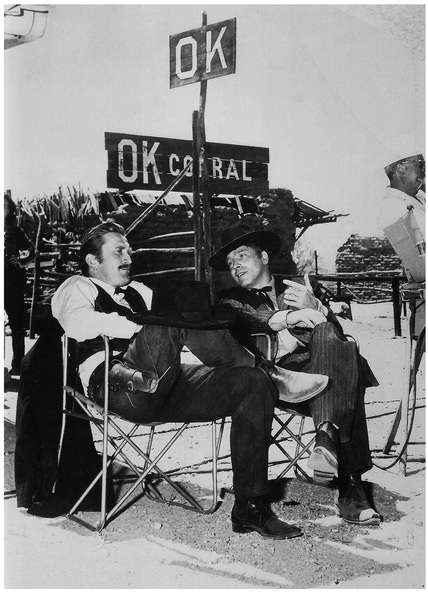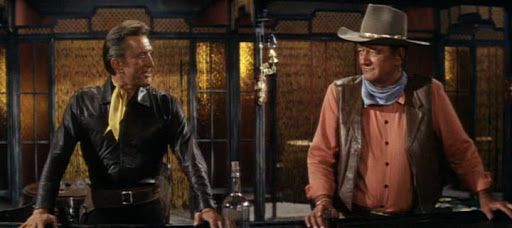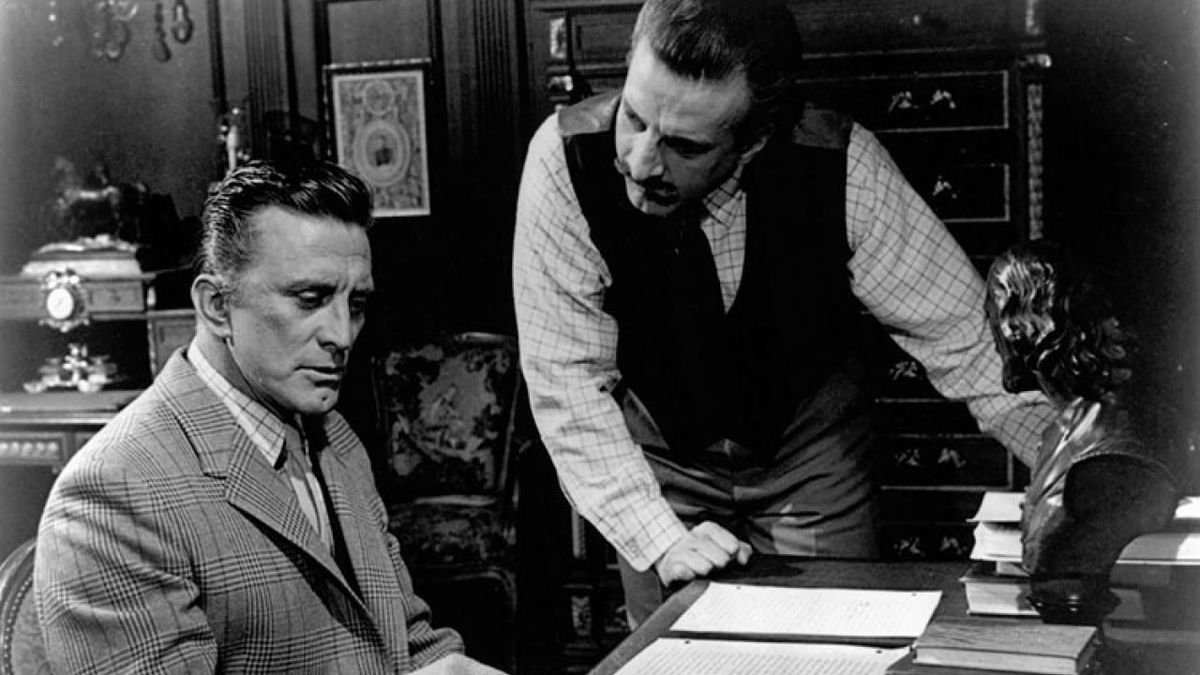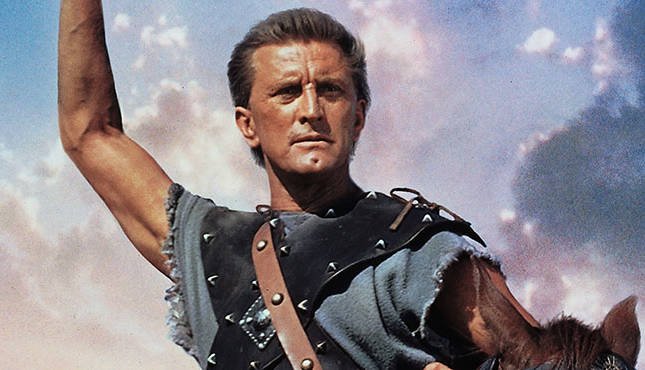Released four years ago, the set is, now, an appropriate memorial to the actor.
With the passing, in early February, of one of the last, and biggest, stars of Hollywood’s Golden Age, eight of Kirk Douglas’ films, collected in what was, in 2016, a centennial collection to celebrate his one hundredth birthday, now seems as fitting a way as any to examine his versatility and expertise as an actor.
The earliest of the films included, Man Without a Star from 1955, to the last, A Lovely Way to Die from 1969, are good examples of his output, not the best nor quite the worst. Although supported by the tight, swift direction of King Vidor and the expert camera of Russell Metty, Man is, perhaps, a pale shadow of a genre Douglas would make his own, the Western. The best, then, Gunfight at the O.K. Corral (1957) and Last Train from Gun Hill (1959), are absent from the set.
 A Lovely Way to Die, on the other hand, falls under the category of a film which, let’s say, was somewhat unnecessary. It conveys neither a typical Douglas persona nor a part he is able to elevate above the absurdly involved plot with its crude implausibilities.
A Lovely Way to Die, on the other hand, falls under the category of a film which, let’s say, was somewhat unnecessary. It conveys neither a typical Douglas persona nor a part he is able to elevate above the absurdly involved plot with its crude implausibilities.
In between the years covered by the box set, is at least one masterpiece (from everyone involved), a number of enjoyable jewels and a couple of fun pastimes.
In the first category is, of course, Spartacus (1960), the one film worth the price of the entire set. Fortunately, this is the 1991 complete restoration, including the reinstatement of the bloodier battle moments and the bathing scene where a Roman militarist, Crassus (Laurence Olivier), attempts to seduce his slave Antoninus (Tony Curtis).
The dialogue here is so veiled, so full of innuendo—there are no physical advances—that even in 1960 it would have seemed hard to catch the meaning of Crassus’ lines: “And taste is not the same as appetite, and therefore not a question of morals. . . . My taste includes both snails and oysters.”
For the restoration, while Curtis was alive to mouth his deleted lines, Olivier had died by then and Anthony Hopkins, who is an expert mimic, supplied Crassus’ words.
Winner of four Oscars, including Peter Ustinov as Best Supporting Actor for slave trainer Batiatus and Metty for Best Color Cinematography, Alex North, composer of the masterly score, was denied an award yet again (he would receive fifteen nominations without winning).
 After this, then, there are lesser films in this box set, whatever their pluses. Of two other Westerns included, The Last Sunset (1961), billing shared with Rock Hudson, is the more traditional, though with some unusual twists. The War Wagon (1967), starring John Wayne and Howard Keel as a comic Native American (remember him costumed as a squaw in Calamity Jane [1953], with Doris Day?), is nothing more than a rip-snorting, tongue-in-cheek adventure—not always easy to achieve but well done here.
After this, then, there are lesser films in this box set, whatever their pluses. Of two other Westerns included, The Last Sunset (1961), billing shared with Rock Hudson, is the more traditional, though with some unusual twists. The War Wagon (1967), starring John Wayne and Howard Keel as a comic Native American (remember him costumed as a squaw in Calamity Jane [1953], with Doris Day?), is nothing more than a rip-snorting, tongue-in-cheek adventure—not always easy to achieve but well done here.
In the remaining Western in the set, Lonely are the Brave (1962), Douglas plays an old-fashioned cowboy out of touch with modern times, going up against a sympathetic sheriff (Walter Matthau) who is out to return him to jail. He only instigates a brawl to be thrown in jail so he could free a friend. When the friend prefers to serve his sentence rather than become a fugitive, Douglas breaks out. His co-star, the man’s wife, is the lovely, underappreciated Gena Rowlands. Lonely was one of Douglas’ favorite films.
And the remaining two movies?— One, a supposed comedy, For Love or Money (1963), is weak in all departments, despite the presence of Mitzi Gaynor and Thelma Ritter. Gig Young, who once again plays that slightly addled, happy-go-lucky fellow familiar from Teacher’s Pet (1958) and That Touch of Mink (1962), provides the chief enjoyment in the film.
 The remaining film is The List of Adrian Messenger (1963). Its director, John Huston, had just come off three consecutive grueling productions—Moby Dick (1956) and misbehaving mechanical whales, The Misfits (1961) and the delaying tactics of Marilyn Monroe and Freud (1962) and the psychotic/drug problems of Montgomery Clift)—and Huston wanted a simple, diverting film, while, at the same time, indulge his love of English fox hunting.
The remaining film is The List of Adrian Messenger (1963). Its director, John Huston, had just come off three consecutive grueling productions—Moby Dick (1956) and misbehaving mechanical whales, The Misfits (1961) and the delaying tactics of Marilyn Monroe and Freud (1962) and the psychotic/drug problems of Montgomery Clift)—and Huston wanted a simple, diverting film, while, at the same time, indulge his love of English fox hunting.
In Messenger, Douglas, in truly his most diversified role, undergoes a series of five disguises, part of a scheme to kill off all heirs, including this Adrian fellow, so as to acquire a wealthy estate.
The rousing fox hunting music by Jerry Goldsmith attests to Douglas films having above average scores. The composers, some in more than one film, include the aforementioned North, but also Malcolm Arnold, Miklós Rózsa (in Douglas’ first film, The Strange Love of Martha Ivers [1946]), Alfred Newman, Max Steiner, David Raksin, Franz Waxman, Richard Rodney Bennett, Ernest Gold and Elmer Bernstein. The composers appearing most often are Goldsmith and Dimitri Tiomkin.
All in all, taking the good with the mediocre (and that one great film), this box set is worth the price and more than a fine tribute to Kirk Douglas.
[embedyt] https://www.youtube.com/watch?v=nYbjkRE483Q[/embedyt]
